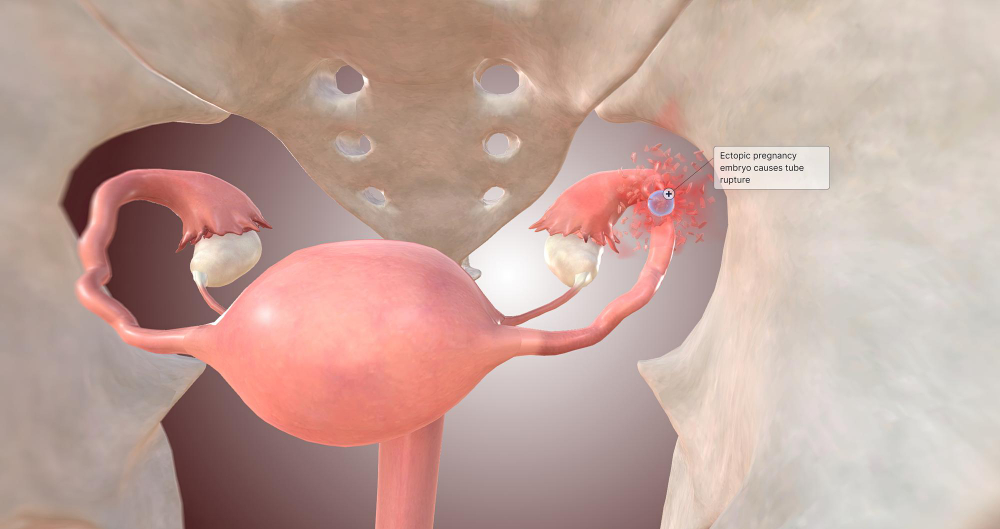Ectopic Pregnancy

Ectopic pregnancy is a potentially life-threatening condition where a fertilized egg implants and grows outside the uterus, most commonly in the fallopian tubes. This type of pregnancy cannot proceed to term and requires prompt medical intervention to prevent serious complications. Understanding the causes, symptoms, and available treatments is crucial for managing ectopic pregnancy effectively.
Causes of Ectopic Pregnancy: Ectopic pregnancy occurs when the fertilized egg implants and begins to develop in a location other than the uterus. Common causes and risk factors include:
- Previous pelvic inflammatory disease (PID): Infections of the reproductive organs can lead to scarring or damage to the fallopian tubes, increasing the risk of ectopic pregnancy.
- Previous ectopic pregnancy: Women who have had an ectopic pregnancy in the past are at a higher risk of experiencing another.
- Tubal surgery or abnormalities: Procedures such as tubal ligation or surgeries to repair damaged fallopian tubes can increase the risk of ectopic pregnancy.
- Hormonal imbalances: Certain hormonal factors may affect the movement of the fertilized egg through the fallopian tubes, increasing the likelihood of ectopic implantation.
Symptoms of Ectopic Pregnancy: Ectopic pregnancy can present with various symptoms, which may vary in severity from woman to woman. Common symptoms include:
- Abdominal or pelvic pain: Sharp or stabbing pain on one side of the abdomen or pelvis may indicate a ruptured fallopian tube.
- Vaginal bleeding: Light vaginal bleeding or spotting may occur, often earlier than expected for a menstrual period.
- Shoulder pain: In rare cases of a ruptured ectopic pregnancy, blood from the fallopian tube can irritate the diaphragm, causing referred pain in the shoulder area.
- Weakness, dizziness, or fainting: Internal bleeding from a ruptured ectopic pregnancy can lead to symptoms of shock, including weakness, dizziness, or fainting.
Common Treatments for Ectopic Pregnancy:
Methotrexate Injection: Methotrexate is a medication that can stop the growth of the embryo and dissolve existing pregnancy tissue in cases where the ectopic pregnancy is detected early and the fallopian tube has not ruptured. After receiving a methotrexate injection, close monitoring and follow-up with a healthcare provider are necessary to ensure the treatment is effective.
Laparoscopic Surgery: Laparoscopic surgery, also known as minimally invasive surgery, may be necessary to remove the ectopic pregnancy and repair any damage to the fallopian tube. This procedure involves making small incisions in the abdomen to access and remove the ectopic pregnancy while preserving the fallopian tube as much as possible.
Emergency Surgery: In cases of a ruptured ectopic pregnancy or severe internal bleeding, emergency surgery may be required to stop the bleeding, remove the ectopic pregnancy, and repair any damage to the fallopian tube or surrounding organs. This procedure is typically performed through a larger abdominal incision (laparotomy) and may involve removing part or all of the affected fallopian tube.
Supportive Care: Following treatment for ectopic pregnancy, supportive care may be necessary to monitor recovery, manage pain, and address any emotional or psychological effects of the experience. Close follow-up with a healthcare provider is essential to ensure optimal healing and future reproductive health.


